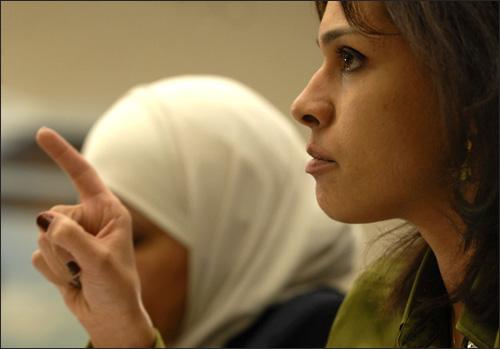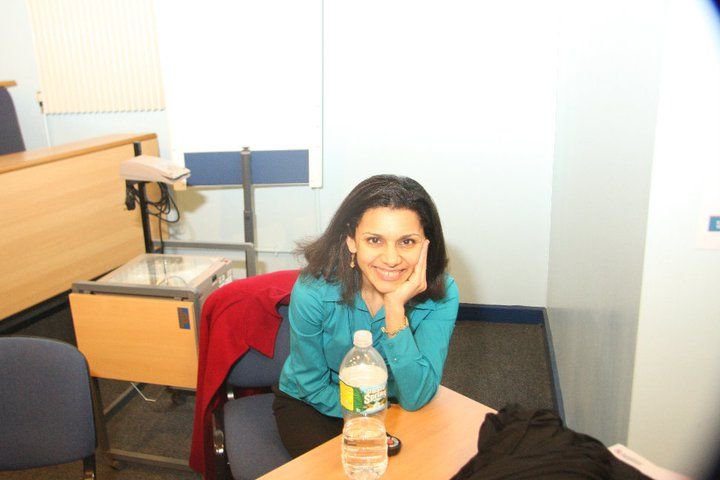
Ms. Namita Nayyar: Who has been your greatest source of inspiration and motivation in becoming a peace activist?
Dr. Dahlia Wasfi: Rachel Corrie. In the early months of 2003, Rachel—a 23 year old college student from Olympia, Washington—was in Gaza in occupied Palestine with the International Solidarity Movement (ISM). As their website describes, the ISM is a Palestinian-led movement committed to resisting the long-entrenched and systematic oppression and dispossession of the Palestinian population, using non-violent, direct-action methods and principles. On March 16, 2003, in Rafah (in Gaza), Rachel and her fellow ISM volunteers were practicing civil disobedience in front of family homes to prevent their illegal demolition by Israeli Army bulldozers. Rachel was in front of the home of a family whom she’d spent several nights with—who had become family to her. After a three-and-a-half-hour standoff, one of the Israeli bulldozers advanced, crushing Rachel beneath its massive blade, then backing up over her. She died shortly thereafter.
Rachel was someone who literally stood up for justice. She was a woman of incredible courage and determination, and I have been blessed to come to know her parents, who continue her efforts for peace through the Rachel Corrie Foundation. Rachel traveled to Palestine and demonstrated that all any of us need to connect with one another is a sense of our shared humanity. For me, she remains a great source of inspiration and hope.
Ms. Namita Nayyar: Belonging to a medical field yourself, what kind of health problems, do you feel, Iraqi women are facing due the prevailing conditions in Iraq?
Dr. Dahlia Wasfi: Wherever there is war and a lack of security, the segments of the population who suffer the most are women and children. They are the most susceptible to kidnappings and violence that follow the breakdown of law and order. Furthermore, lack of access to medical care jeopardizes the health and lives of women and their families.
Iraqi women–along with Libyan women, Palestinian women, Syrian women, Yemeni women, and women anywhere in the world where bombs are falling—face a tremendous struggle of survival. Millions have been displaced by military aggression, leading to additional health challenges. Internally displaced persons and refugees (those displaced outside their home country) face food insecurity, lack of access to potable water, and often lack of shelter. In overcrowded conditions of camps, communicable diseases such as respiratory infections can develop and spread rapidly. Without adequate sanitation, dysentery can become a killer for the very young and the very old. And on top of all of these complications of war, there is a heavy mental and emotional toll. Many suffer from post-traumatic stress disorder (PTSD) and depression without diagnosis and treatment resources available. Those who endure such harrowing conditions demonstrate incredible strength and determination.

Ms. Namita Nayyar: What 5 Health Tips can you give to Iraq Women to cope up better during war conditions and build up strong?
Dr. Dahlia Wasfi: I live a life of privilege in the US, with easy access to food, water, shelter, electricity, and security, not to mention internet. One of the most difficult experiences of my life thus far was the three months I spent living with my family under the US/UK-led military occupation of Iraq in 2006. It took me six months to recover both mentally and physically from the difficulties of basic survival that my relatives face on a daily basis. Though constantly dealing with food shortages, lack of electricity, and lack of access to water, they find ways to cope and support their families. Iraqi women are incredible survivors. They have endured war and occupation since the 1980s and tragic illness and starvation during the years of deadly economic sanctions (1990-2003). I feel that they have more to teach me about survival than I have to teach them.
Videos
Disclaimer
The Content is not intended to be a substitute for professional medical advice, diagnosis, or treatment. Always seek the advice of your physician or other qualified health provider with any questions you may have regarding a medical condition.